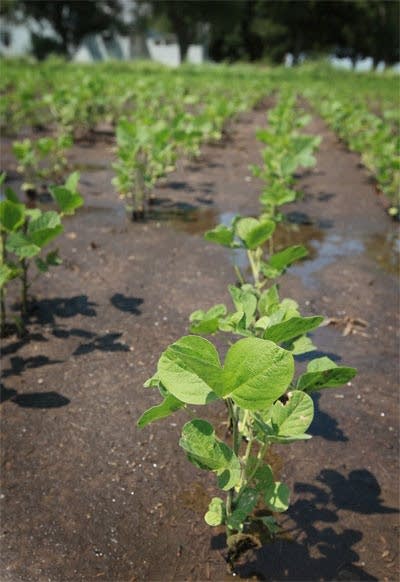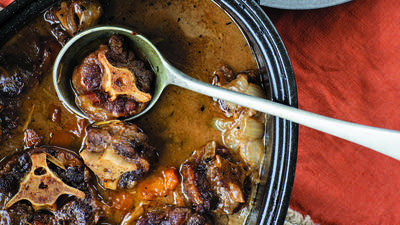
From food stamps and farm subsidies to meat labeling, H.R. 2642, aka the Agricultural Act of 2014 or the farm bill, guides the country's agricultural and food policies. Of course, it also instigates strong opinions from all sides.
The $956 billion farm bill, which was authored by Sen. Debbie Stabenow, expands crop insurance to farmers, creates new subsidies for rice and peanut growers, and cuts benefits in the food stamp program. It also creates a labeling provision that requires meat producers to stamp products with the country of origin.
"When I think about farmers, I think of these bucolic people growing family farms, fruits and vegetables with a few cattle," says Marion Nestle, Paulette Goddard Professor of Nutrition, Food Studies, and Public Health at New York University, one of the broadest academic food programs in the country. "That's not who benefits from the farm bill."
Nestle, the author of Safe Food, What to Eat and Food Politics, weighs in on the Agricultural Act of 2014. [Ed. note: The interview with Nestle was recorded on Feb. 11, 2014.]
Lynne Rossetto Kasper: Your blog, Food Politics, a little while back had a statement that got my attention: You said this farm bill is "politically corrupt." I'd love to hear some of the specifics that you’re looking at.
 Marion Nestle
Marion Nestle
Marion Nestle: It's very difficult to understand the farm bill without understanding its history and without understanding the way our political system works. But the farm bill from the get-go, all the way back to President Lyndon Johnson, was set up to be political right from the beginning.
Johnson was worried that he couldn't get a food stamp program passed to meet the needs of the poor in urban areas in a country that was mainly rural and cared about agribusiness and farmers in the Midwest. He didn't think that the Northeastern and the urban areas in the country would vote for support for agribusiness. So he logrolled -- he put them together in the farm bill so that they're inextricably tied. That politicizes the whole thing right from the beginning. [Ed. note: Find more about the farm bill's history on Nestle's blog.]
Nobody is sitting back and saying, "What is the best way that we could support agriculture in this country in a way that will make sure that farmers make an adequate living, that farm workers are paid decently, and that we have an agricultural system that promotes health and supports the environment?" That's not what's happening.
What's happening is everybody is competing for their own piece of the federal pie. What you see are these really ugly battles over food stamps, over direct payments, over a system that taxpayers pay for that supports agribusiness (and the largest elements of agribusiness at that).
I thought it was not an accident that President Obama signed the farm bill in front of a John Deere tractor. Deere & Company is one of the few companies that is able to provide crop insurance, so it benefits enormously from the bill. Of course the Deere company is a very generous donor to members of Congress.
LRK: There's a lot of debate and dissatisfaction about the crop insurance part of this bill. [Ed. note: According to The New York Times, "One of the most contentious elements of the farm bill was the elimination of $5 billion in direct subsidies to farmers for their crops, whether they grew them or not. The subsidies were replaced by an insurance program that will help farmers only when they need it."] Could you explain this?
MN: Not very well. What I can say is that taxpayers pay 62 percent of the premiums, so the government pays for it.
When I taught a course on the farm bill and the class read the section on crop insurance and the documents that had been written about the crop insurance program, they said, "We should be in the crop insurance business." You get the premiums and if there's a failure, the government pays for it.
LRK: So essentially, a farmer pays for crop insurance but he or she is subsidized in that payment?
MN: Right.
 Soybeans after rain
Photo: Scott Olson/Getty Images
Soybeans after rain
Photo: Scott Olson/Getty Images
LRK: But isn't this something that's really helpful to a farmer? You roll the dice every time you plant for a season; a rainstorm can take you out.
MN: Yes. But we're not really talking about farmers benefiting from the farm bill. When I think about farmers, I think of these bucolic people growing family farms, fruits and vegetables with a few cattle. That's not who benefits from the farm bill.
Agribusiness benefits from the farm bill. This is support of agribusiness, which is doing very, very well these days and has for years.
I wish that farmers were helped by the farm bill. Maybe the crop insurance will help some of them and that would be wonderful, but that's not where most of it is going.
LRK: One of the things that people complained about for a long time was this idea that the subsidies go to farmers who are doing large-scale commodity crops, the soybeans, the corn, etc., but not to farmers who are growing the five-a-day that we're being told to achieve.
MN: Absolutely not.
LRK: Has that changed with this farm bill?
MN: No, I don't think so. There used to be a clause in the direct payments to farmers that forbade them from growing fruits and vegetables if they were getting subsidies for corn and soybeans. That presumably has been eliminated, and I'm not sure how that works now. That might be an incentive to have agribusiness go into fruits and vegetables. That's either good, bad or indifferent depending on how you feel about how they grow these things.
LRK: What are your feelings about the food stamp cut? That's been the subject of a lot of conversation.
MN: The best thing that you can say about the farm bill is that it could have been a lot worse. The Republicans in the house were eager to cut food stamps by an extraordinary amount -- as it is, the cut is about 1 percent and not nearly as horrible as it could have been.
So people who are looking at it from the outside say, "Not bad, you know there's an $800-million cut a year, that's not so terrible, that's not $50 a person a year, everybody can handle that." They're not poor. They're not experiencing what it's like not to have any money and to try to get through a winter, to try to get through life with very little money in an economy that just doesn't have any jobs.
LRK: What are some of the positives in the new farm bill?
MN: There are little tokens scattered throughout the bill that do lovely things for organics and for farmers markets.
[Ed. note: Former Agriculture Secretary Dan Glickman said in a statement from the Bipartisan Policy Center: "I’m glad to see the bill will allow low-income Americans to double their SNAP benefits at farmers markets, which will help tens of thousands of people eat more nutritious foods." But according to Eat Drink Politics: "Because any SNAP retailer can apply for and receive incentive grant funding, some of these incentive program dollars may end up at gas stations, convenience stores, and Walmart. These retailers are far less likely to focus their inventory on local produce and healthy eating."]
It looks to me like there's money for FoodCorps in the farm bill -- that would be terrific. That's the group that goes into schools and teaches school kids how to garden and do other life skills like that around food. I think that's absolutely terrific.
Sprinkled in and out there are a bunch of things that are probably quite useful and that will help people who are trying to work with the poor and low-income groups about trying to eat more fruits and vegetables.
LRK: At least there's some encouragement.
MN: There's some encouragement. It's not as much as I would have liked to see.
Before you go...
Each week, The Splendid Table brings you stories that expand your world view, inspire you to try something new and show how food brings us together. We rely on you to do this. And, when you donate, you'll become a member of The Splendid Table Co-op. It's a community of like-minded individuals who love good food, good conversation and kitchen companionship. Splendid Table Co-op members will get exclusive content each month and have special opportunities for connecting with The Splendid Table team.
Donate today for as little as $5.00 a month. Your gift only takes a few minutes and has a lasting impact on The Splendid Table and you'll be welcomed into The Splendid Table Co-op.




